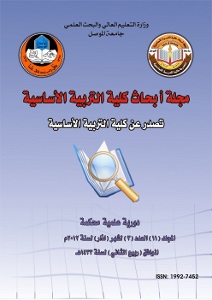Employing the Information Function and Standard Error to Evaluate the Quality of A Criterion Referenced Tests Based on Lord Model
Abstract
Accordingly,a total of (50) test items were developed to measure the abilities of third-year students in the Departments of Psychological and Educational Counseling and Special Education at the College of Education, Salahaddin University-Erbil, in the Kurdistan Region of Iraq.These items assessed their knowledge in the subject of Psychological and Educational Measurement and Evaluation. Validity, discrimination, and reliability coefficients were calculated using a representative sample of (568) female students, selected through the cluster random sampling method. The study aimed to examine the validity of several hypotheses formulated to evaluate the effectiveness of Latent Trait Theory, based on Lord's two-parameter model, in scaling the items of a criterion-referenced achievement test. The scaling was conducted according to difficulty and discrimination parameters to eliminate any uncertainty in estimating students' abilities in psychological and educational measurement and evaluation, as well as their mastery of the subject.The hypotheses were tested using appropriate statistical methods, leveraging the the Bilog-MG3 program.Based on the above, the results of the study indicated the suitability of Lord's model for scaling the test items. All items of the achievement test fell within the acceptable limits and conformed to Lord model. The results also showed that the values of the difficulty and discrimination parameters for the achievement test matched Lord's model within the framework of Latent Trait Theory. Furthermore, the maximum information values and the standard error values for both the items and the test as a whole supported the test's efficiency in measuring ability in psychological and educational measurement and evaluation
